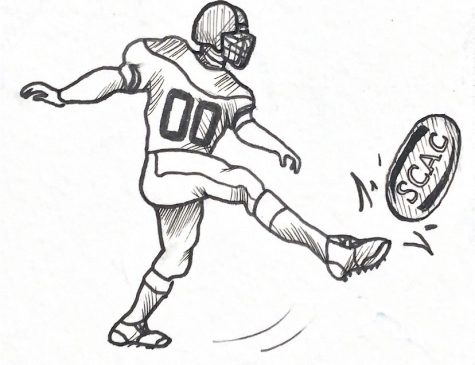Kayla’s Korner: Serena Williams bears the brunt of sexism in sports
LA Times sportswriter Helene Elliott writes of Serena’s “hard reality” after loss to Naomi Osaka
A few weeks ago, superstar tennis player Naomi Osaka won the Australian Open women’s singles final against rising star Jennifer Brady. In the semifinals a week prior, Osaka defeated Serena Williams, prompting some commentary regarding Serena’s alleged “fading domination” from a sports columnist in the Los Angeles Times.
Sports columnist Helene Elliott wrote a column titled, “Once-dominant Serena Williams faces hard reality after loss to Naomi Osaka.” The headline itself, sensationalized, suggests that Williams’ career as a superstar tennis player was abruptly cut short upon Osaka’s entrance into professional tennis.
The column was released almost immediately after Serena’s loss to Osaka, prompting readers to question why the mere headline was so suggestive of Serena’s downfall. Elliott writes that, “Osaka started slowly, admittedly nervous about facing her childhood idol. Not so long ago, Williams would have exploited that vulnerability. But as in their tumultuous encounter in the 2018 U.S. Open final, Osaka’s will and execution were greater, and Williams was left to face hard reality.”
Unsurprisingly, Elliott’s writing garnered some backlash from Twitter users after she shared the column on her account. Some people, including myself, felt that the headline was misleading and sexist.
Twitter user @UnleashedBroly criticized Elliott for undermining Williams’ tennis career. “I’m embarrassed to have authors like this at the LA Times. She’s 39 and just reached the semifinals of a Grand Slam Tournament. She didn’t lose to an unranked player at the Denny’s Open.”
User @URALLCHROME addressed double standards in Elliott’s writing, “la times sucks for this and i don’t even need to explain why, leave black women alone.”
Where was Tom Brady’s “hard reality” after he lost Superbowl LII to the Philadelphia Eagles in 2018? Roger Federer hasn’t won a grand slam since 2018, yet there seems to be no mention of the “hard reality” he must face.
User @austinmpriest echoed a similar sentiment that highlighted the ridiculousness of Elliott’s headline, “Once dominant Lebron James faces hard reality after he loses a game. Probably should just quit forever.”
Elliott’s column proceeds to end with a bizarre last sentence.
“As Osaka walked out to the court for the match she tapped her name on the wall that honors past winners, as if to draw assurance from it. At her post-match news conference Osaka — who was mentored by Kobe Bryant — wore a Lakers jacket for similar reasons. ‘Today I felt like I needed some extra strength,’ she said. She found it, and in that she is a worthy successor to Williams.”
Though Serena is still a superstar player, Elliott undermines Serena by referring to Osaka as her “successor.” Just four days later, Elliott wrote a piece titled “Novak Djokovic’s latest Australian Open title shows he’s not slowing down.” The title depicts a strong difference between how Elliott views female athletes in contrast to male athletes. Of course, Djokovic won the title while Serena didn’t, but in her article, Elliott didn’t bring down any male tennis players like she did Serena.
In fact, Elliott was incredibly kind to Djokovic’s potential successors, saying, “Those youngsters are still knocking at the door. But Djokovic, 33, became the second man to win at least nine titles at any Grand Slam event; he follows Nadal, who has won the French Open 13 times.”
Currently, Serena is ranked as the No. 7 singles player in the world according to the Women’s Tennis Association (WTA) Tour’s website. Her highest singles career ranking has been the No. 1 position, currently occupied by Ashleigh Barty.
From the beginning of her tennis career, Williams, along with her sister Venus, have been the targets of anti-Black misogynistic commentary from sports reporters globally. Just three years ago in 2018, the Herald Sun published a racist cartoon by Mark Knight depicting an irritated, angry Serena, drawn to exaggeration and in alignment with racist caricatures of Black women. This came after Osaka defeated Williams in the 2018 U.S. Open women’s final. Across the court stans a slim blonde woman, meant to be Naomi Osaka, talking to the umpire. The umpire says, “Can’t you just let her win?”
Serena Williams, by virtue of being a Black woman, has been vulnerable to attacks her entire career. Osaka, who is Japanese and Haitian, is often depicted as an approachable woman of color while Williams stands as the aggressive, unapproachable Black woman. Whether misogyny or racism, Serena just can’t catch a break. Elliott’s column is proof of the work that’s yet to be done, or rather, undone.

I'm a senior Computer Science major and a Classical Studies minor from Newton, North Carolina with a passion for art. I also work at the Center for Experiential...















